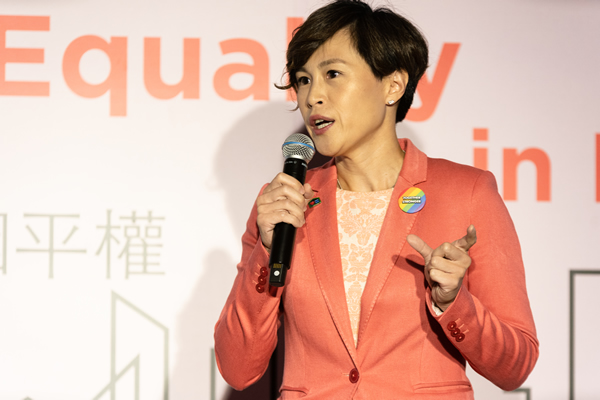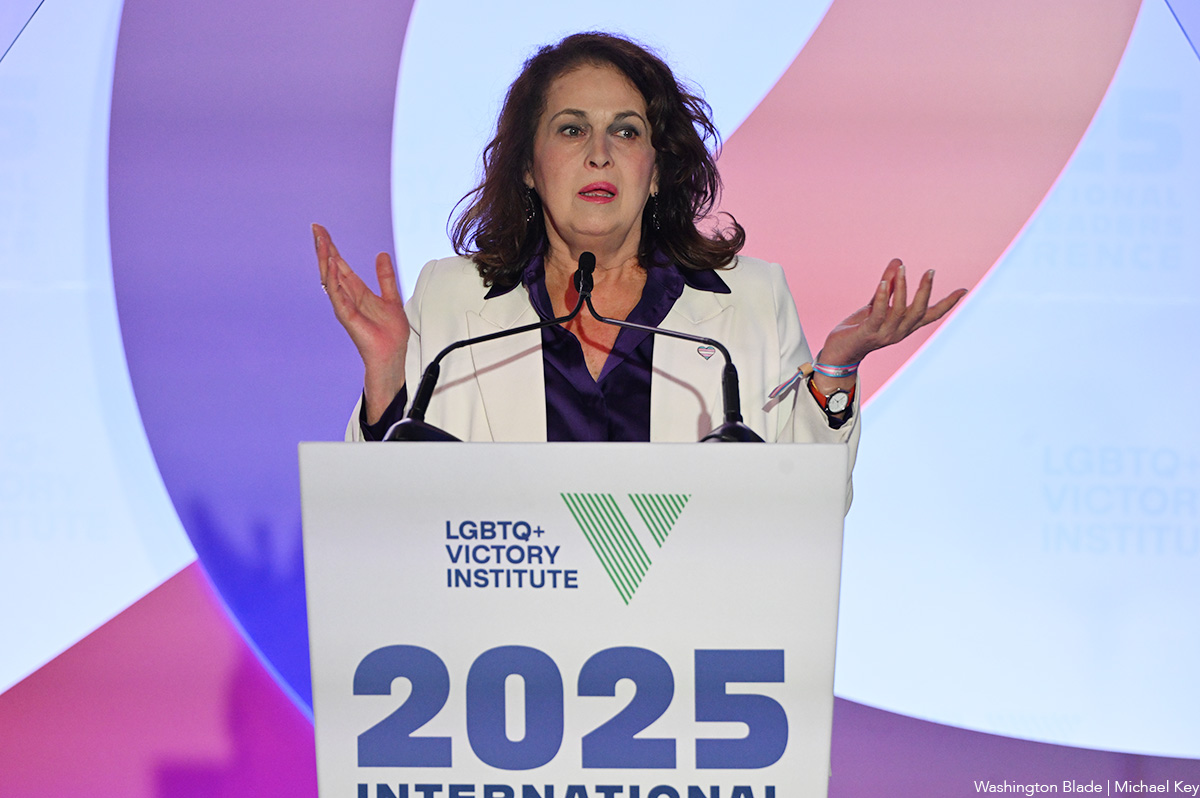World
Hong Kong activist dismisses calls to boycott Gay Games
WTA suspended China tournaments after tennis player disappeared

An LGBTQ activist in Hong Kong on Tuesday dismissed calls to boycott the 2023 Gay Games over China’s human rights record.
“In Hong Kong, the team behind Gay Games has really worked tirelessly to bring it to Hong Kong and it will be a very good opportunity to showcase diversity and people working together and the human spirit at its best,” Gigi Chao told the Washington Blade during a telephone interview from Hong Kong. “So, if it all gets rather political and if you twist the sentiments of what they want China to be, it will just really not work.”
Chao is the co-founder of Hong Kong Marriage Equality, a group that seeks to extend marriage rights to same-sex couples in the former British colony. Chao also founded the Faith in Love Foundation, a group that seeks to increase awareness of LGBTQ issues in Hong Kong.
Chao is a member of the OutRight Action International board of directors. Chao is slated to speak in the group’s annual summit that will take place virtually this week.
“All eyes are peeled on the events of next year: The Beijing Olympics, the relationship between Beijing and the U.S. as relationships either improve or sour over the course of the next 12 months and also trade and the global economic situation … it’s not a rosy picture by all means,” Chao told the Blade. “Everybody is bracing for the worst in terms of how the world recovers from COVID, but LGBTIQ rights continue.”
Chao said Dennis Philipse, a Hong Kong resident who co-chairs Gay Games Hong Kong, and his colleagues “want the Gay Games to be a celebration of the human spirit in terms of sport.”
“In Hong Kong, there’s certainly no shortage of people engaged in sport and enjoying sports,” said Chao.
Gay Games Hong Kong in September announced the postponement of the quadrennial event until 2023 because of the pandemic. The Federation of Gay Games, which oversees the Gay Games, awarded the games to Hong Kong over D.C. and Guadalajara, Mexico.
Hong Kong was a British colony until China regained control of it in 1997.
Upwards of 2 million people took part in pro-democracy protests that took place in Hong Kong in 2019.
Hong Kong’s National Security Law, which, according to human rights activists, makes it easier for authorities to punish anyone who challenges the Chinese government, took effect in 2020. Hong Kong Chief Executive Carrie Lam, who is closely aligned with the Chinese government, supports the statute.
The Women’s Tennis Association last week announced the suspension of tournaments in Hong Kong and throughout China in response to the disappearance of Peng Shuai, a Chinese tennis star, after she publicly accused former Vice Premier Zhang Gaoli of sexual assault. The Biden administration on Monday announced a diplomatic boycott of the 2022 Winter Olympics that are slated to take place in Beijing in February.
“The Federation of Gay Games continues to monitor the situation in Hong Kong regarding COVID-19, the National Security Law and all other aspects that affect the safety and security of our event,” Sean Fitzgerald, co-president of the Federation of Gay Games, told the Blade in a statement after the Women’s Tennis Association announced it had suspended all of its tournaments in China. “We are committed to hosting Gay Games 11 in Hong Kong in November 2023.”
Chao acknowledged Gay Games organizers are “facing a lot of opposition from all directions.” Chao also noted Hong Kong’s government is “not actually positively promoting it.”
“If we can get really high-profile athletes to participate, I think that’s going to be a huge call for everybody to participate,” said Chao.
Egypt
Iran, Egypt object to playing in Seattle World Cup ‘Pride Match’
Game to take place on June 26

Iran and Egypt have objected to playing in a “Pride Match” that will take place in Seattle during the 2026 World Cup.
The Egyptian Football Association on Tuesday said it told FIFA Secretary General Mattias Grafström in a letter that “it categorically rejects holding any activities related to supporting (homosexuality) during the match between the Egyptian national team and Iran, scheduled to be held in Seattle, USA, on June 26, 2026, in the third round of the group stage of the 2026 World Cup.” Football Federation Islamic Republic of Iran President Mehdi Taj told ISNA, a semi-official Iranian news agency that both his country and Egypt “protested this issue.”
The 2026 World Cup will take place in the U.S., Canada, and Mexico. The draw took place at the Kennedy Center on Dec. 5.
Iran is among the handful of countries in which consensual same-sex sexual relations remain punishable by death.
The State Department’s 2023 human rights report notes that while Egyptian law “did not explicitly criminalize consensual same-sex sexual activity, authorities regularly arrested and prosecuted LGBTQI+ persons on charges including ‘debauchery,’ prostitution, and ‘violating family values.’” Egyptian authorities “also reportedly prosecuted LGBTQI+ individuals for ‘misuse of social media.’”
“This resulted in de facto criminalization of same-sex conduct and identity,” notes the report.
The 2024 human rights report the State Department released earlier this year did not include LGBTQ-specific references.
Soccer has ‘unique power to unite people across borders, cultures, and beliefs’
The June 26 match between Iran and Egypt coincides with Seattle Pride. The Washington Post reported the Seattle FIFA World Cup 2026 Local Organizing Committee decided to hold the “Pride Match” before last week’s draw.
“As the Local Organizing Committee, SeattleFWC26’s role is to prepare our city to host the matches and manage the city experience outside of Seattle Stadium,” said SeattleFWC26 Vice President of Communications Hana Tadesse in a statement the committee sent to the Washington Blade on Wednesday. “SeattleFWC26 is moving forward as planned with our community programming outside the stadium during Pride weekend and throughout the tournament, partnering with LGBTQ+ leaders, artists, and business owners to elevate existing Pride celebrations across Washington.”
“Football has a unique power to unite people across borders, cultures, and beliefs,” added Tadeese. “The Pacific Northwest is home to one of the nation’s largest Iranian-American communities, a thriving Egyptian diaspora, and rich communities representing all nations we’re hosting in Seattle. We’re committed to ensuring all residents and visitors experience the warmth, respect, and dignity that defines our region.”
The 2034 World Cup will take place in Saudi Arabia.
Consensual same-sex sexual relations remain punishable by death in the country. The 2022 World Cup took place in neighboring Qatar, despite concerns over the country’s anti-LGBTQ rights record.
Spain
Victory Institute honors transgender Spanish senator in D.C.
Carla Antonelli describes Trump policies as ‘absolutely terrifying’

The LGBTQ+ Victory Institute on Dec. 5 inducted Spanish Sen. Carla Antonelli into its LGBTQ+ Political Hall of Fame.
Antonelli in 2011 became the first openly transgender woman elected to a regional legislative office in Spain when she won a seat in the Madrid Assembly.
She left Prime Minister Pedro Sánchez’s leftist Spanish Socialist Workers’ Party in 2022. Antonelli in 2023 became the first openly trans woman in the Spanish Senate when Más Madrid, a progressive regional party, named her Pablo Gómez Perpinyà’s successor in the chamber.
The Hall of Fame induction took place during the Victory Institute’s annual International LGBTQ+ Leaders Conference at the JW Marriott Hotel in downtown D.C. The Washington Blade spoke with Antonelli on Dec. 6.
“We are living in rather turbulent times, hence the importance and necessity of gatherings like this one … to unite in these times, come together, and develop common strategies and policies.”
Antonelli, 66, grew up in Güímar, a municipality on the island of Tenerife in Spain’s Canary Islands.
She said transphobia forced her to leave her hometown in 1977, and she turned to sex work to support herself. Antonelli’s political activism began that year when she joined the campaign against a 1970 law that criminalized consensual same-sex sexual acts and LGBTQ people.
General Francisco Franco, whose regime governed the country from 1936-1975, approved the Law on Social Danger and Rehabilitation. Spain in 1995 removed the statute’s remaining provisions from its penal code.
Antonelli in the 1980s became a well-known actress. She is also a former spokesperson for Federación Estatal de Lesbianas, Gays, Transexuales y Bisexuales, a Spanish LGBTQ advocacy group known by the acronym FELGTB.
‘We will not go back to the margins’
Antonelli in February gave an impassioned speech in support of trans rights on the Senate floor.
She specifically singled out members of Vox, a far-right political party, over their efforts to repeal a landmark 2023 law that allows people who are at least 16 to legally change their gender without medical intervention. Antonelli’s speech — and her proclamation that “we will not go back to the margins” — quickly went viral.
Antonelli told the Blade she received messages of support from people in Algeria, Australia, Turkey, Mauritius, and elsewhere around the world. She added her speech was “the conclusion of everything I can feel at any given moment, also the pride of having lived through all these historical processes.”
“For whatever reason, I was born in ’59, and I lived through the dictatorship in my country,” said Antonelli. “I lived through the dictator’s death and I lived through what Spain was like exactly 50 years ago. It began to walk in freedom, and so freedom must be defended.”
Antonelli feared US would not allow her into the country
The Victory Institute conference took place less than a year after the Trump-Vance administration took office.
Antonelli in June traveled to D.C. and participated in WorldPride 2025. She admitted the White House’s anti-trans policies left her wondering whether the U.S. would allow her into the country as a trans woman.
The White House only recognizes two genders: male and female.
President Donald Trump after he took office signed an executive order that bans the State Department from issuing passports with “X” gender markers. U.S. Citizenship and Immigration Services in August announced it will ensure “male aliens seeking immigration benefits aren’t coming to the U.S. to participate in women’s sports.”
Spain is among the countries that have issued advisories for trans and nonbinary people who are planning to visit the U.S.
“This speaks volumes about the policies of intimidation and targeting they’re implementing, policies that have made trans people scapegoats for all of humanity’s ills,” Antonelli told the Blade.
“In the United States, now with Trump, it’s absolutely terrifying because we’re talking about not just taking away a right, they’re going against our lives, against our very existence,” she added.
Antonelli in June met U.S. Rep. Sarah McBride (D-Del.), the first openly trans woman elected to Congress. Antonelli told the Blade she “watched with sorrow” how U.S. Rep. Nancy Mace (R-S.C.) and other Republicans treated the Delaware Democrat after her historic 2024 election.
“The first thing some vengeful scoundrels, thirsty for evil, do is prohibit her from entering the women’s restrooms,” said Antonelli.
“It’s nothing more than a desire to humiliate, to degrade,” she added. “Behind many of these policies lies a desire to do harm. In other words, these are bad people, evil people whose principles aren’t an ideology. They revel in it. They enjoy thinking about how they are making other human beings suffer.”
Antonelli also stressed “visibility” is “freedom.”
“The more they try to erase us, the more we have to be visible,” she said. “They know perfectly well that visibility inevitably leads to normality, to normalization, which is nothing more than what is repeated daily, routinely. What’s normal is what you see every day, so they’re trying to prevent us from being visible in every way possible, because what they don’t want is for society to accept, to live with this truth.”
Antonelli also offered advice for trans people who want to run for office.
“Always be upfront,” she said. “Don’t hold back, but above all, don’t forget where you come from. Because you might be lucky enough to rise and become a representative of the people, but don’t forget your origins.”
Antonelli noted she is the Más Madrid spokesperson for health, equality, culture, and other issues, but added she “will never, never, never abandon my trans sisters and the LGBTQ+ community.”
“I never severed times with my roots,” Antonelli told the Blade. “My roots are a conservative family, a town I had to flee and to which I didn’t return until 32 years later. My future, my past, is a street corner. My past is being able to make that journey in a democracy and go from that street corner to a seat in the Madrid Assembly and then from there to a seat in the Senate. And that is precisely the greatness of democracy.”
She ended the interview by a quote she gave to El País, a Spanish newspaper.
“Those who used to call us faggots have to now call us ‘your honors,’” said Antonelli.

What does longing for your child look like? What happens when they resurface in front of you, when that rift was once an immeasurable open sea — a searing pain that silently hollowed you out for decades? For the child wrenched away by circumstance and thrown into the purgatory of always feeling in-between: in between home, in between being a whole person, in between who you could have been and who you are now — what does it mean to become and belong?
In filmmaker Jota Mun’s documentary “Between Goodbyes”, the fragmented yearning for home, family and identity are woven together into a tremendous and at times dream-like contemplation of the self, focused on various family members set adrift by a deceitful international adoption machine.
The story is focused on Mieke Murkes, a queer Korean adoptee who grew up in the rural village of Vaassen in the Netherlands. Shortly after her birth in 1982, she was raised by Willy, a devout evangelical Christian woman. But the story does not begin with Mieke in Vaassen. It begins with Okgyun, her original mother, walking through an ephemeral meadow as she makes her way to a shoreline. This is our first point of loss.
It is important to understand how the stories of Okgyun and Mieke exist. In “Between Goodbyes”, we see a frustrating glimpse into the cultural and political forces that created this separation. Since 1955, 200,000 children have been adopted from South Korea, and just three years ago, several of these adoptees found that their documents had been falsified. Murkes would sift through her own papers in “Between Goodbyes”, noting their dull and rote descriptions of her physical appearance and health. “The paperwork is as if you’re buying a new car,” Murkes says.
Written nearby: “Both parents are unknown,” a falsehood that leaves the family breathless. It is a gut punch.
This March, a South Korean governmental agency admitted that it had violated the rights of adoptees, but an investigation that began in 2022 at the behest of over 350 Korean adoptees has been halted. Whether or not retribution can ever be paid is up in the air, but the reeling grief and complicated self-reckoning many of these adoptees and their families face are rendered and expressed with deep tenderness in Mun’s documentary. “I did not know how to fit the Korean part of me in there,” Murkes said.
When Okgyun was pregnant with Mieke, she was also raising three other daughters: Mijin, Mikyung and Taekyung. The population was booming, and mothers like herself were being shamed for continuing to have children. Considering abortion, Okgyun recounts a midwife who convinced her not to go through with it — that if the child were a boy, she should keep him. If it turned out to be a girl, she could give her away to live “a good life” in the U.S. “Men are always positioned above women,” Okgyun said. “I always hated that.”
After Mieke was born, Okgyun’s mother-in-law told her to give her away. “She was gone before I saw her face,” Okgyun said. “I let her go.” Her guilt tightens her throat, trembles in her voice. “I dreamed of Mieke a lot. I can’t tell you how many times,” Okgyun said. “Dreaming and forgetting, dreaming, and forgetting. The thought that kept me going is that one day I can find Mieke.”
What ensued was a several years-long search. Kwangho, Mieke’s original father, pleaded with an adoption agency for any leads about Mieke. They denied him several times and his desperation only grew. “I had to find her to be at peace before I die,” he said.
Meanwhile, Mieke’s own grief and confusion were compounding. When she was beginning to discover her queerness, she was deeply ingrained in local religious spaces. What made her feel free, the church treated as an aberration — as behavior that resulted from loss.
When she would eventually meet her original family, they, too, had trouble processing her queer identity and masculine presentation. To them, queerness was “acquired” from being raised in a foreign land. With time, they grew to embrace Mieke and her partner, Marit, even as misunderstandings arose. Of this, Mieke’s conflictedness is explored. Gay rights are more advanced and accepted in the Netherlands than in South Korea, but this does not mean contending with her queerness would have been easy with her adoptive mother, Willy. “It probably would have disappointed her a lot,” Mieke tearfully revealed.
Mieke’s stepping in between knowing and unknowing is reminiscent of Okgyun’s dreaming and forgetting — their grief and confusion move within them, replicating themselves over and over again. “Between Goodbyes” dives deeply into this in order to offer a portrait of healing: of its complications and the necessity of community support to achieve this.
Mun discusses the film with the Los Angeles Blade, diving into how reunification between adoptees and original family members is, in many ways, made nearly impossible by factors like language and cultural barriers enforced and held tightly in place by the international adoption system. This film illustrates a break in this narrative and the mighty efforts behind it all.
A broadcast version of “Between Goodbyes” is now available to stream on PBS. See below for more information.
Can you tell me about the inception of making “Between Goodbyes”? Have you always wanted to tell a story about international Korean adoption from a queer perspective?
As a queer Korean adoptee myself, [there are] so many intersections that I haven’t quite seen on screen before. So I was always really excited about making something about my community. And then I’d say, in 2017, is around when I started getting closer to zeroing in on the idea. I think part of it was through befriending Mieke and hearing her parents’ story. Hearing about their efforts really blew my mind.
So much of the standard narrative is that adoptees initiate the search. So even before meeting [Okgyun and Kwangho], it just felt like it spoke so loudly of not only their character, but a piece of the puzzle that I had never considered — that they could be longing for us. And I think as an adoptee, you always wonder what [your original parents] would think. So it’s very noticeable that we almost don’t ever hear from them directly. Even in narrative stories of adoption, they’re usually deleted, or they’re written in a really flat way that feels like they’re serving the plot. I’ve never seen a depiction of birth mothers in particular who are questioning their own circumstances or feel angry about it.
There’s a lot of nuance given to all of the different people that we see in the story. The pain is layered and deep, and we don’t just view it from one perspective. What was it like having to portray this hurt, when many adoption stories typically focus solely on the adoptee’s emotional and personal journey?
It’s so unique through each lens, even though it’s the same pain. Like her sisters — of course, it’s going to affect them. Even if she never said anything, they must have felt it. It just ripples out to everyone and keeps expanding.
Originally, it was focused on Mieke, because that’s who I had the most access to, and she’s the closest to me in terms of general identity markers. So in my mind, I felt more confident that I could tell her story in a nuanced way. But what about Okgyun? I was hitting a similar barrier of communication that Mieke had hit. That’s part of why our main producer, Zoe Sua Cho, was so essential in conveying more about Okygun and the original family’s side of the story.
When I was in the early stages of developing the film, there was a quote that I felt was really inspirational: “In our hurting, we did not realize that we were stolen from each other” (by SN Désirée Cha from Outsiders Within Writing on Transracial Adoption.) The same quote came back to me in the edit and helped us find a narrative structure that went beyond just one person’s perspective.
What if the main character is the collective trauma, a singular event that causes the family to splinter and suffer across decades? I wanted to explore how tempting it is in these moments of righteous anger at systemic problems to end up fighting with each other. I feel like they both had to mourn something that was so much bigger than any one family. Mieke’s adoption affected so many people that I almost wanted that to be the main character. How do we not get lost in that pain and still try to come back together? It’s too much to carry alone.
So the main character is not necessarily one person, but the issue that you’re trying to tackle throughout the story. It also makes me think about how the documentary itself, or the making of it, also participates in this community healing that I feel like was the focus of “Between Goodbyes”.
I hope it’s an important layer. Suffice to say I think I always deflect to name a singular main character. I wanted to show everyone’s point of view while of course highlighting especially Okgyun and Mieke.
What else can you share about your approach to filmmaking?
You know, I was on this wonderful panel earlier this year, hosted by A-DOC, and I kind of surprised myself in preparing for it. I realized, actually, I have a lot of strong beliefs on filmmaking ethics that I hope come through in the film. For example, I reject the genius artist myth. The fantasy that if an artist is talented enough, they get permission to treat everyone around them terribly. That exploitation and squeezing things out of people is the best way to make great art.
Instead, I want to believe that the sensitivity, the care, and emotional work I poured in is going to come shining through in the film. And I do think that’s part of why we witnessed so many intensely vulnerable moments that I couldn’t have predicted.
This emotional connection to the film is also, visually, represented in artistic and inventive ways. There are sequences interspersed throughout that feel dream-like and cinematic. Creatively, what was it like to structure and craft how you wanted those scenes to be, the weight that they carried, and why you wanted to represent them in that way?
Aw, thanks for saying so! I was clear from the beginning that I wanted certain moments in the film to look as cinematic and epically life-changing as they feel in real life. Because visually, sometimes these moments of heartbreak can look rather dull. The deep heartbreak of a farewell at the airport. What does it look like? It looks like two people hugging in a very normal-looking terminal. But that’s not what it feels like. It feels larger than life. So to me, every single one of the art [scenes] has a very literal symbolism in my mind.
I really enjoy the complexity given to the family, both through the artistic symbolism and through the different angles we get to view them in. When it comes to Mieke’s queer identity, there are varying levels of acceptance and also tension that co-exist. One of her sisters, Mikyung, skirts around terms and labels, instead saying Mieke is “like that,” and “I don’t know anyone like that.” There was this feeling that queerness is learned or acquired elsewhere — that Mieke “wouldn’t have turned out like that” if she had grown up with her original family in Korea.
I can’t be sure what they were implying but you know, I definitely didn’t want to fall into a common trope of seeing Western values as being so liberal and accepting and framing all other cultures as homophobic. I want to be clear that there is a queer community in Seoul. It’s not the same as Amsterdam, of course, but it does exist.
That’s part of why it was important for me to include Mieke mentioned what she thinks her Dutch mom would have thought — just to clarify that homophobes are everywhere. There are plenty of them here in the West as well. Mieke’s Dutch parents were Evangelist Christians. So it’s not like everyone in the West is free to be a lesbian, you know?
Another moment that struck me in the film was a moment where we, as the audience, get to see you clearly. In this scene, we see you and Mieke on a rooftop, and you’re consoling her as she’s trying to prepare for a difficult conversation with her original mother, Okgyun. Did you have to find a balance in terms of being the director of this film and being Mieke’s friend?
It was really important to me to show friendship and how much that can help you along the journey. You think that for her to emotionally process things, it would have to be with her mom. But that rooftop conversation felt so transformative in itself. And then what ended up being the kind of mirror scene to that was Okgyun talking to Ruth [a fellow original mother]. She needed a buddy, too. How many times in life are we like: the opposing party doesn’t need to get it, but if my friend just could — that would give me so much relief and patience to enter the actual conversation with the person I’m upset with.
Being so personally close to Mieke and her family meant that my film was about all people I loved and cared about. I think the documentary field comes from such a long history of an anthropological approach. It’s like, “I’ve helicoptered in, and I just met you, but I’m the expert artist.” I wish the ethos were the opposite; we need to care about everyone, from the participants to the crew. I don’t want the blood, sweat, and tears to come through on the screen. I hope that watching it makes people feel cloaked in tenderness and care.
I was so worried about everyone, probably too much. It’s such a weird thing to ask people to do, to be in a film, so I took that with a lot of responsibility. Be aware of the impact you’re having. I am having an effect on this family’s life. I almost wanted to be like: “Forget my art project.” This is about the rest of their lives as a family, and that’s more important. So it became a light on my path, trying to make decisions as best I could to have a positive impact on their relationship.
It almost made me question my ethics in a different direction. “Am I intervening too much?” And that’s a strange thing: I have to admit I exist. I’m not a fly on the wall. And I think that’s why the conversation on the roof was really the most vulnerable for me, because I was showing myself. I’ve actually been here the whole time, cheering them on or trying to diffuse tension. I set out to make a film about how hard it is to stay in reunion, but now I’ve realized I’ll be heartbroken if their reunion doesn’t last. So in many ways the film was really just a vehicle for my attempt at keeping us all connected across so many distances, and that’s my own emotional journey or connection to their story.
Mun plans to release the full-length film in 2026, along with deleted scenes and additional footage. Up-to-date information can be found on the film’s Instagram page.


















